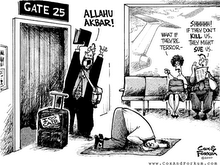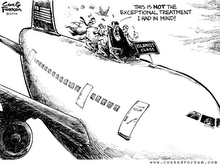"IT was bad that Daniel Pearl got killed, but ..."
I strained to hear the conversation across the aisle at the Sherry Lansing Theater, but as the second part of the sentence began to roll from the movie-watcher's lips, my friend came bounding back to our seats, chattering. After we left the screening at Paramount, the "but" tore at me. What was the rest of the woman's sentence? Had she not been as affected as I was by the story of The Wall Street Journal reporter's brutal murder that had just unfolded on the screen before us? Worse, did the "but" signal a segue into justification, a tired refrain that the U.S. had somehow brought Pearl's fate upon him, to be followed by catchwords du jour "occupation" and "imperialism"?
The screening of "A Mighty Heart" that I attended Thursday was hosted by the Council on American-Islamic Relations. The film, although the product of less-than-conservative Hollywood talent, admirably resists descending into an anti-American screed, though both sides of the political aisle can find snippets of the script to make or break their preconceived assertions about war, terrorism and Islamic extremism.
Hussam Ayloush, L.A. executive director of CAIR; Rabbi Haim Beliak, founder of Jews on First; and Rev. Peter Laarman, executive director of Progressive Christians Uniting...
Laarman pegged the problem on "the number of Christians living in a bubble ... of naivete," stressing that we should "look at our own crusading mentality" and "look at how Christian America lets people escape from reality." He also said that the "next big thing from the Christian right's demonization of Muslims" could be the "next terror attack."
Ayloush said things won't change until we "change perceptions," and "not from what Fox News tells us."
"Violence is a cycle," he later said. "If the reaction to occupation is Sept. 11," and on and on. "Occupation" apparently refers to al-Qaida's stated objection to the pre-9-11 presence of U.S. forces on the Arabian Peninsula. But as we were invited there by the respective governments, it's not occupation.
The rabbi blamed "Islamophobia" in the Jewish community. "We have a problem in the Jewish community with our fanatics," said Beliak. "... It would be hard for me to imagine that a Jewish organization would have the parallel courage to put on an event like this."
These characterizations of the U.S. as ignorant crusaders and occupiers only exacerbate the problem and make work for journalists at home and abroad even more dangerous. It's not "dialogue." It's ideological warfare that brands those who want to fight terrorism as warmongers or religious bigots. At the risk of sounding trite, it's just what the terrorists want.
Wednesday, June 27, 2007
MUST READ...
Subscribe to:
Post Comments (Atom)









No comments:
Post a Comment